CSR, Social Media, GSD, Whistleblowing
VerifiedAdded on 2023/01/17
|9
|2875
|100
AI Summary
This report explores the relationship between CSR, social media, global sustainable development (GSD), and whistleblowing. It discusses the impact and challenges of these concepts in SMEs and how social media can be used for marketing and building relationships. It also highlights the importance of GSD to SMEs and the effects of whistleblowing on the workplace.
Contribute Materials
Your contribution can guide someone’s learning journey. Share your
documents today.

CSR
Secure Best Marks with AI Grader
Need help grading? Try our AI Grader for instant feedback on your assignments.
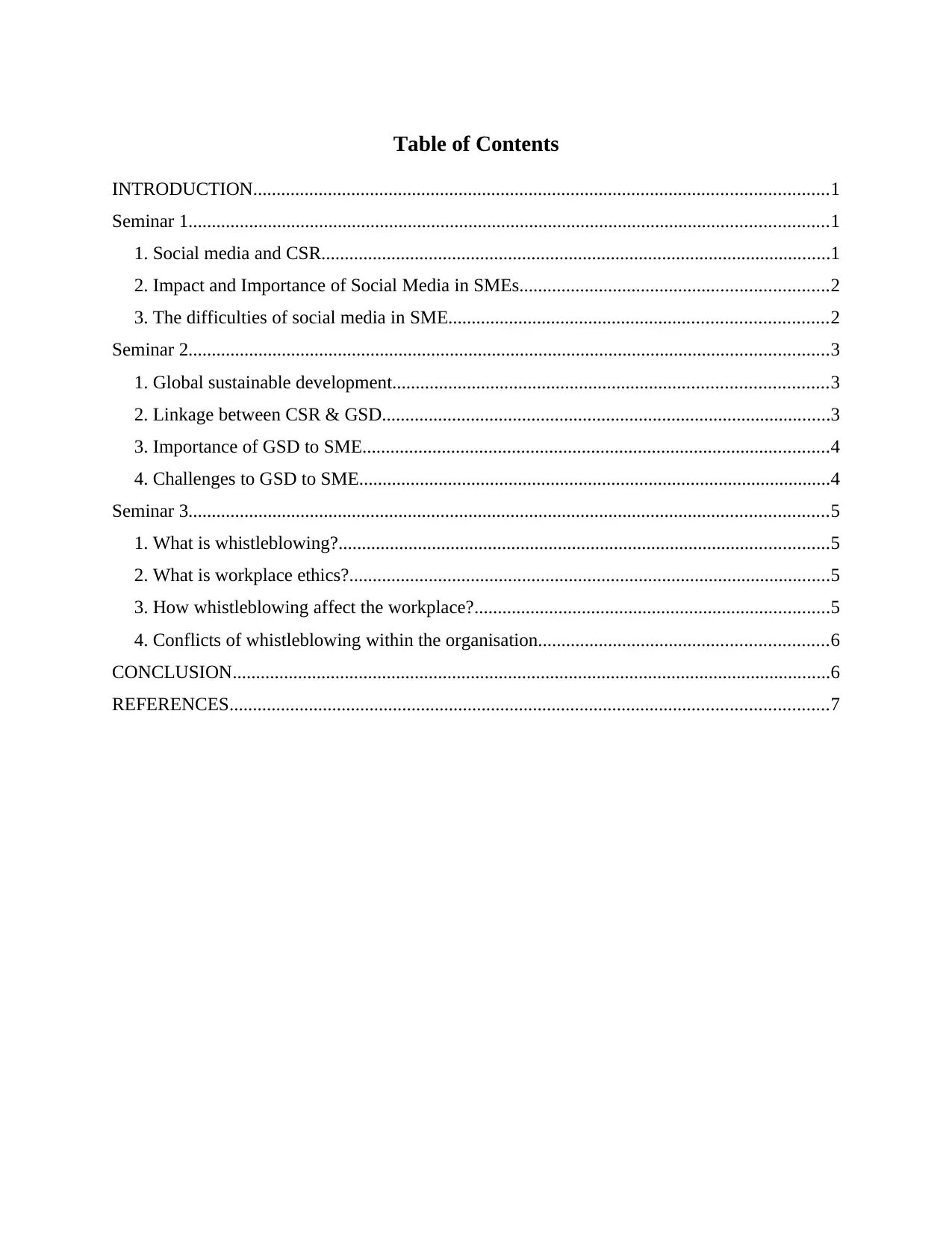
Table of Contents
INTRODUCTION...........................................................................................................................1
Seminar 1.........................................................................................................................................1
1. Social media and CSR.............................................................................................................1
2. Impact and Importance of Social Media in SMEs..................................................................2
3. The difficulties of social media in SME.................................................................................2
Seminar 2.........................................................................................................................................3
1. Global sustainable development.............................................................................................3
2. Linkage between CSR & GSD................................................................................................3
3. Importance of GSD to SME....................................................................................................4
4. Challenges to GSD to SME.....................................................................................................4
Seminar 3.........................................................................................................................................5
1. What is whistleblowing?.........................................................................................................5
2. What is workplace ethics?.......................................................................................................5
3. How whistleblowing affect the workplace?............................................................................5
4. Conflicts of whistleblowing within the organisation..............................................................6
CONCLUSION................................................................................................................................6
REFERENCES................................................................................................................................7
INTRODUCTION...........................................................................................................................1
Seminar 1.........................................................................................................................................1
1. Social media and CSR.............................................................................................................1
2. Impact and Importance of Social Media in SMEs..................................................................2
3. The difficulties of social media in SME.................................................................................2
Seminar 2.........................................................................................................................................3
1. Global sustainable development.............................................................................................3
2. Linkage between CSR & GSD................................................................................................3
3. Importance of GSD to SME....................................................................................................4
4. Challenges to GSD to SME.....................................................................................................4
Seminar 3.........................................................................................................................................5
1. What is whistleblowing?.........................................................................................................5
2. What is workplace ethics?.......................................................................................................5
3. How whistleblowing affect the workplace?............................................................................5
4. Conflicts of whistleblowing within the organisation..............................................................6
CONCLUSION................................................................................................................................6
REFERENCES................................................................................................................................7
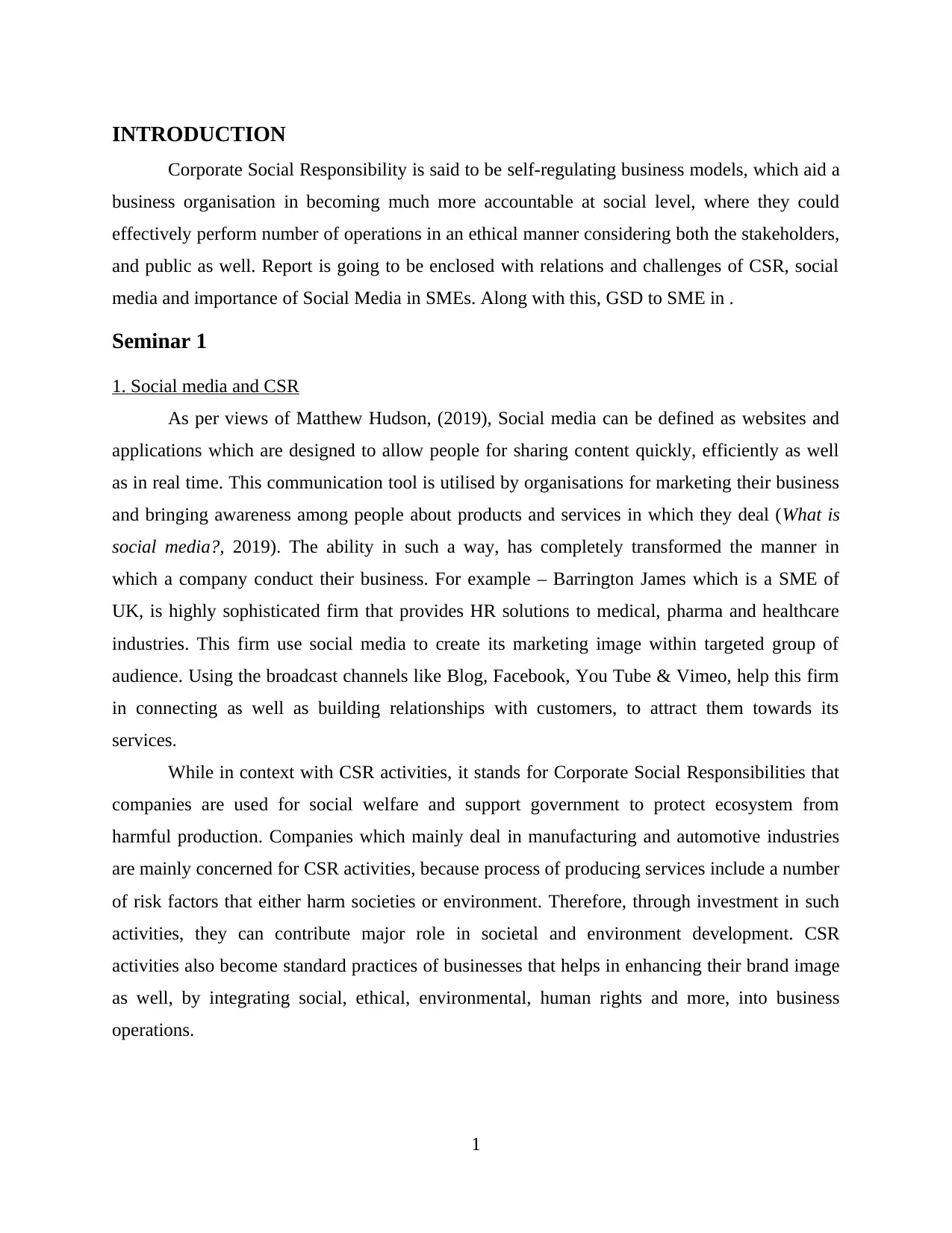
INTRODUCTION
Corporate Social Responsibility is said to be self-regulating business models, which aid a
business organisation in becoming much more accountable at social level, where they could
effectively perform number of operations in an ethical manner considering both the stakeholders,
and public as well. Report is going to be enclosed with relations and challenges of CSR, social
media and importance of Social Media in SMEs. Along with this, GSD to SME in .
Seminar 1
1. Social media and CSR
As per views of Matthew Hudson, (2019), Social media can be defined as websites and
applications which are designed to allow people for sharing content quickly, efficiently as well
as in real time. This communication tool is utilised by organisations for marketing their business
and bringing awareness among people about products and services in which they deal (What is
social media?, 2019). The ability in such a way, has completely transformed the manner in
which a company conduct their business. For example – Barrington James which is a SME of
UK, is highly sophisticated firm that provides HR solutions to medical, pharma and healthcare
industries. This firm use social media to create its marketing image within targeted group of
audience. Using the broadcast channels like Blog, Facebook, You Tube & Vimeo, help this firm
in connecting as well as building relationships with customers, to attract them towards its
services.
While in context with CSR activities, it stands for Corporate Social Responsibilities that
companies are used for social welfare and support government to protect ecosystem from
harmful production. Companies which mainly deal in manufacturing and automotive industries
are mainly concerned for CSR activities, because process of producing services include a number
of risk factors that either harm societies or environment. Therefore, through investment in such
activities, they can contribute major role in societal and environment development. CSR
activities also become standard practices of businesses that helps in enhancing their brand image
as well, by integrating social, ethical, environmental, human rights and more, into business
operations.
1
Corporate Social Responsibility is said to be self-regulating business models, which aid a
business organisation in becoming much more accountable at social level, where they could
effectively perform number of operations in an ethical manner considering both the stakeholders,
and public as well. Report is going to be enclosed with relations and challenges of CSR, social
media and importance of Social Media in SMEs. Along with this, GSD to SME in .
Seminar 1
1. Social media and CSR
As per views of Matthew Hudson, (2019), Social media can be defined as websites and
applications which are designed to allow people for sharing content quickly, efficiently as well
as in real time. This communication tool is utilised by organisations for marketing their business
and bringing awareness among people about products and services in which they deal (What is
social media?, 2019). The ability in such a way, has completely transformed the manner in
which a company conduct their business. For example – Barrington James which is a SME of
UK, is highly sophisticated firm that provides HR solutions to medical, pharma and healthcare
industries. This firm use social media to create its marketing image within targeted group of
audience. Using the broadcast channels like Blog, Facebook, You Tube & Vimeo, help this firm
in connecting as well as building relationships with customers, to attract them towards its
services.
While in context with CSR activities, it stands for Corporate Social Responsibilities that
companies are used for social welfare and support government to protect ecosystem from
harmful production. Companies which mainly deal in manufacturing and automotive industries
are mainly concerned for CSR activities, because process of producing services include a number
of risk factors that either harm societies or environment. Therefore, through investment in such
activities, they can contribute major role in societal and environment development. CSR
activities also become standard practices of businesses that helps in enhancing their brand image
as well, by integrating social, ethical, environmental, human rights and more, into business
operations.
1
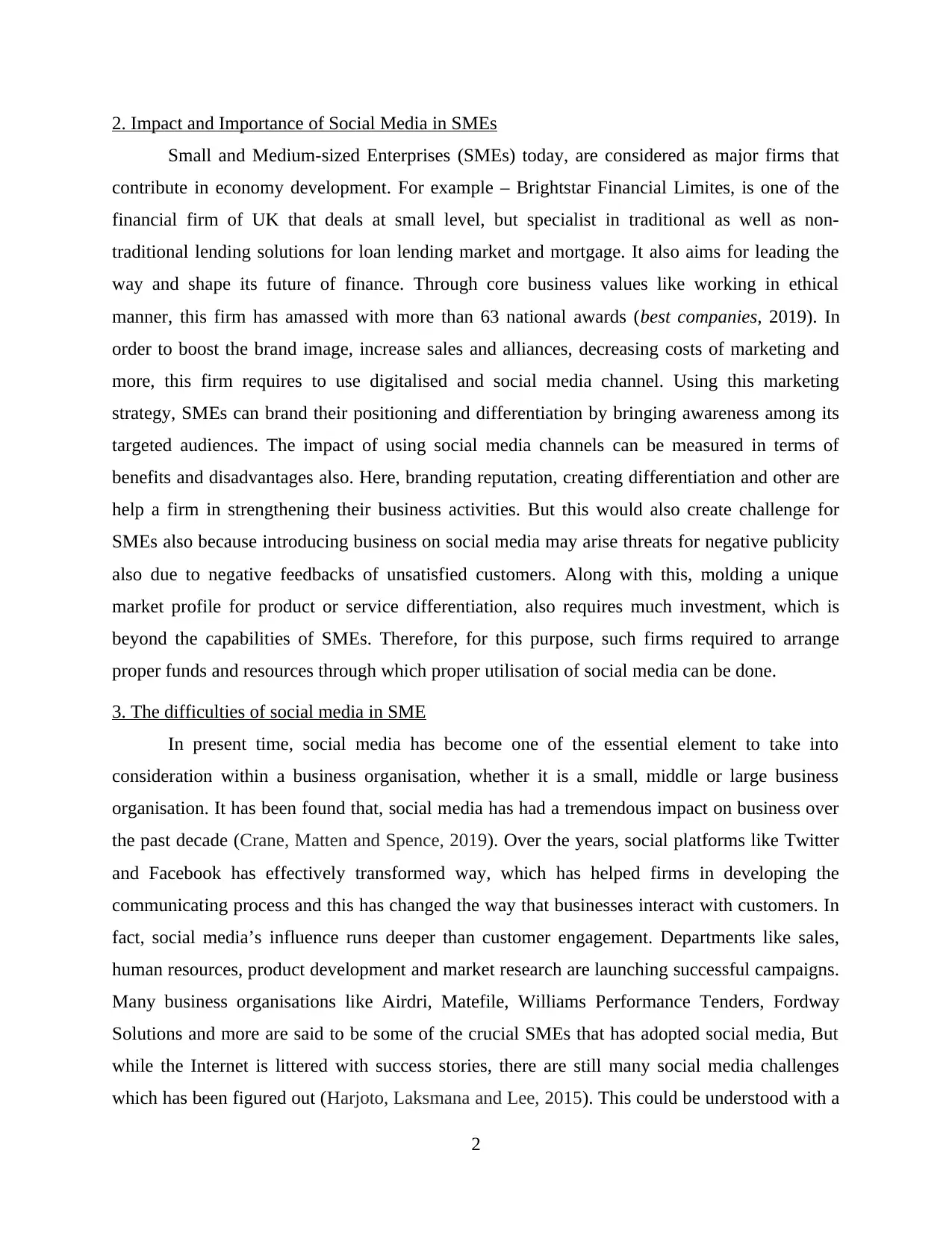
2. Impact and Importance of Social Media in SMEs
Small and Medium-sized Enterprises (SMEs) today, are considered as major firms that
contribute in economy development. For example – Brightstar Financial Limites, is one of the
financial firm of UK that deals at small level, but specialist in traditional as well as non-
traditional lending solutions for loan lending market and mortgage. It also aims for leading the
way and shape its future of finance. Through core business values like working in ethical
manner, this firm has amassed with more than 63 national awards (best companies, 2019). In
order to boost the brand image, increase sales and alliances, decreasing costs of marketing and
more, this firm requires to use digitalised and social media channel. Using this marketing
strategy, SMEs can brand their positioning and differentiation by bringing awareness among its
targeted audiences. The impact of using social media channels can be measured in terms of
benefits and disadvantages also. Here, branding reputation, creating differentiation and other are
help a firm in strengthening their business activities. But this would also create challenge for
SMEs also because introducing business on social media may arise threats for negative publicity
also due to negative feedbacks of unsatisfied customers. Along with this, molding a unique
market profile for product or service differentiation, also requires much investment, which is
beyond the capabilities of SMEs. Therefore, for this purpose, such firms required to arrange
proper funds and resources through which proper utilisation of social media can be done.
3. The difficulties of social media in SME
In present time, social media has become one of the essential element to take into
consideration within a business organisation, whether it is a small, middle or large business
organisation. It has been found that, social media has had a tremendous impact on business over
the past decade (Crane, Matten and Spence, 2019). Over the years, social platforms like Twitter
and Facebook has effectively transformed way, which has helped firms in developing the
communicating process and this has changed the way that businesses interact with customers. In
fact, social media’s influence runs deeper than customer engagement. Departments like sales,
human resources, product development and market research are launching successful campaigns.
Many business organisations like Airdri, Matefile, Williams Performance Tenders, Fordway
Solutions and more are said to be some of the crucial SMEs that has adopted social media, But
while the Internet is littered with success stories, there are still many social media challenges
which has been figured out (Harjoto, Laksmana and Lee, 2015). This could be understood with a
2
Small and Medium-sized Enterprises (SMEs) today, are considered as major firms that
contribute in economy development. For example – Brightstar Financial Limites, is one of the
financial firm of UK that deals at small level, but specialist in traditional as well as non-
traditional lending solutions for loan lending market and mortgage. It also aims for leading the
way and shape its future of finance. Through core business values like working in ethical
manner, this firm has amassed with more than 63 national awards (best companies, 2019). In
order to boost the brand image, increase sales and alliances, decreasing costs of marketing and
more, this firm requires to use digitalised and social media channel. Using this marketing
strategy, SMEs can brand their positioning and differentiation by bringing awareness among its
targeted audiences. The impact of using social media channels can be measured in terms of
benefits and disadvantages also. Here, branding reputation, creating differentiation and other are
help a firm in strengthening their business activities. But this would also create challenge for
SMEs also because introducing business on social media may arise threats for negative publicity
also due to negative feedbacks of unsatisfied customers. Along with this, molding a unique
market profile for product or service differentiation, also requires much investment, which is
beyond the capabilities of SMEs. Therefore, for this purpose, such firms required to arrange
proper funds and resources through which proper utilisation of social media can be done.
3. The difficulties of social media in SME
In present time, social media has become one of the essential element to take into
consideration within a business organisation, whether it is a small, middle or large business
organisation. It has been found that, social media has had a tremendous impact on business over
the past decade (Crane, Matten and Spence, 2019). Over the years, social platforms like Twitter
and Facebook has effectively transformed way, which has helped firms in developing the
communicating process and this has changed the way that businesses interact with customers. In
fact, social media’s influence runs deeper than customer engagement. Departments like sales,
human resources, product development and market research are launching successful campaigns.
Many business organisations like Airdri, Matefile, Williams Performance Tenders, Fordway
Solutions and more are said to be some of the crucial SMEs that has adopted social media, But
while the Internet is littered with success stories, there are still many social media challenges
which has been figured out (Harjoto, Laksmana and Lee, 2015). This could be understood with a
2
Secure Best Marks with AI Grader
Need help grading? Try our AI Grader for instant feedback on your assignments.
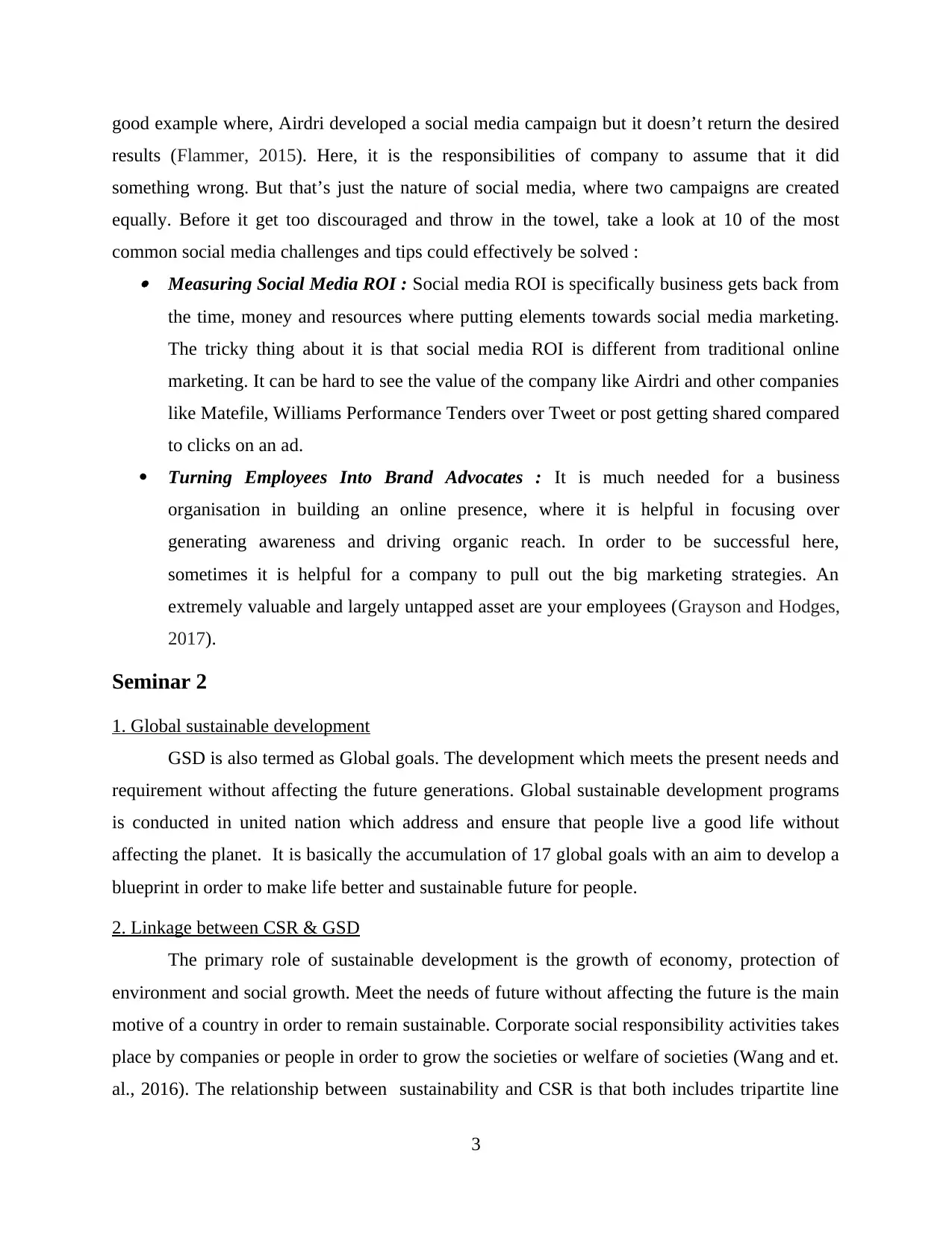
good example where, Airdri developed a social media campaign but it doesn’t return the desired
results (Flammer, 2015). Here, it is the responsibilities of company to assume that it did
something wrong. But that’s just the nature of social media, where two campaigns are created
equally. Before it get too discouraged and throw in the towel, take a look at 10 of the most
common social media challenges and tips could effectively be solved : Measuring Social Media ROI : Social media ROI is specifically business gets back from
the time, money and resources where putting elements towards social media marketing.
The tricky thing about it is that social media ROI is different from traditional online
marketing. It can be hard to see the value of the company like Airdri and other companies
like Matefile, Williams Performance Tenders over Tweet or post getting shared compared
to clicks on an ad.
Turning Employees Into Brand Advocates : It is much needed for a business
organisation in building an online presence, where it is helpful in focusing over
generating awareness and driving organic reach. In order to be successful here,
sometimes it is helpful for a company to pull out the big marketing strategies. An
extremely valuable and largely untapped asset are your employees (Grayson and Hodges,
2017).
Seminar 2
1. Global sustainable development
GSD is also termed as Global goals. The development which meets the present needs and
requirement without affecting the future generations. Global sustainable development programs
is conducted in united nation which address and ensure that people live a good life without
affecting the planet. It is basically the accumulation of 17 global goals with an aim to develop a
blueprint in order to make life better and sustainable future for people.
2. Linkage between CSR & GSD
The primary role of sustainable development is the growth of economy, protection of
environment and social growth. Meet the needs of future without affecting the future is the main
motive of a country in order to remain sustainable. Corporate social responsibility activities takes
place by companies or people in order to grow the societies or welfare of societies (Wang and et.
al., 2016). The relationship between sustainability and CSR is that both includes tripartite line
3
results (Flammer, 2015). Here, it is the responsibilities of company to assume that it did
something wrong. But that’s just the nature of social media, where two campaigns are created
equally. Before it get too discouraged and throw in the towel, take a look at 10 of the most
common social media challenges and tips could effectively be solved : Measuring Social Media ROI : Social media ROI is specifically business gets back from
the time, money and resources where putting elements towards social media marketing.
The tricky thing about it is that social media ROI is different from traditional online
marketing. It can be hard to see the value of the company like Airdri and other companies
like Matefile, Williams Performance Tenders over Tweet or post getting shared compared
to clicks on an ad.
Turning Employees Into Brand Advocates : It is much needed for a business
organisation in building an online presence, where it is helpful in focusing over
generating awareness and driving organic reach. In order to be successful here,
sometimes it is helpful for a company to pull out the big marketing strategies. An
extremely valuable and largely untapped asset are your employees (Grayson and Hodges,
2017).
Seminar 2
1. Global sustainable development
GSD is also termed as Global goals. The development which meets the present needs and
requirement without affecting the future generations. Global sustainable development programs
is conducted in united nation which address and ensure that people live a good life without
affecting the planet. It is basically the accumulation of 17 global goals with an aim to develop a
blueprint in order to make life better and sustainable future for people.
2. Linkage between CSR & GSD
The primary role of sustainable development is the growth of economy, protection of
environment and social growth. Meet the needs of future without affecting the future is the main
motive of a country in order to remain sustainable. Corporate social responsibility activities takes
place by companies or people in order to grow the societies or welfare of societies (Wang and et.
al., 2016). The relationship between sustainability and CSR is that both includes tripartite line
3
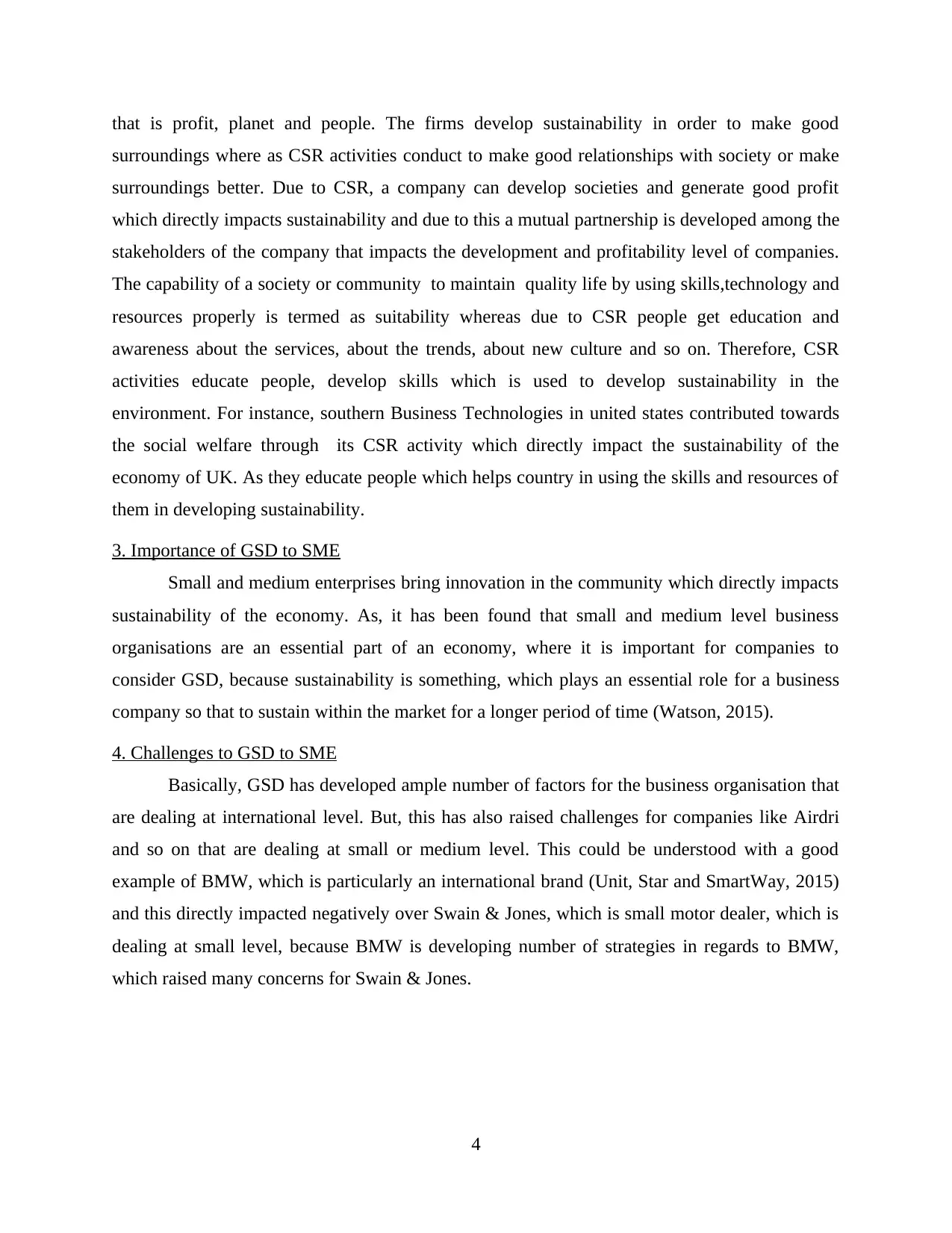
that is profit, planet and people. The firms develop sustainability in order to make good
surroundings where as CSR activities conduct to make good relationships with society or make
surroundings better. Due to CSR, a company can develop societies and generate good profit
which directly impacts sustainability and due to this a mutual partnership is developed among the
stakeholders of the company that impacts the development and profitability level of companies.
The capability of a society or community to maintain quality life by using skills,technology and
resources properly is termed as suitability whereas due to CSR people get education and
awareness about the services, about the trends, about new culture and so on. Therefore, CSR
activities educate people, develop skills which is used to develop sustainability in the
environment. For instance, southern Business Technologies in united states contributed towards
the social welfare through its CSR activity which directly impact the sustainability of the
economy of UK. As they educate people which helps country in using the skills and resources of
them in developing sustainability.
3. Importance of GSD to SME
Small and medium enterprises bring innovation in the community which directly impacts
sustainability of the economy. As, it has been found that small and medium level business
organisations are an essential part of an economy, where it is important for companies to
consider GSD, because sustainability is something, which plays an essential role for a business
company so that to sustain within the market for a longer period of time (Watson, 2015).
4. Challenges to GSD to SME
Basically, GSD has developed ample number of factors for the business organisation that
are dealing at international level. But, this has also raised challenges for companies like Airdri
and so on that are dealing at small or medium level. This could be understood with a good
example of BMW, which is particularly an international brand (Unit, Star and SmartWay, 2015)
and this directly impacted negatively over Swain & Jones, which is small motor dealer, which is
dealing at small level, because BMW is developing number of strategies in regards to BMW,
which raised many concerns for Swain & Jones.
4
surroundings where as CSR activities conduct to make good relationships with society or make
surroundings better. Due to CSR, a company can develop societies and generate good profit
which directly impacts sustainability and due to this a mutual partnership is developed among the
stakeholders of the company that impacts the development and profitability level of companies.
The capability of a society or community to maintain quality life by using skills,technology and
resources properly is termed as suitability whereas due to CSR people get education and
awareness about the services, about the trends, about new culture and so on. Therefore, CSR
activities educate people, develop skills which is used to develop sustainability in the
environment. For instance, southern Business Technologies in united states contributed towards
the social welfare through its CSR activity which directly impact the sustainability of the
economy of UK. As they educate people which helps country in using the skills and resources of
them in developing sustainability.
3. Importance of GSD to SME
Small and medium enterprises bring innovation in the community which directly impacts
sustainability of the economy. As, it has been found that small and medium level business
organisations are an essential part of an economy, where it is important for companies to
consider GSD, because sustainability is something, which plays an essential role for a business
company so that to sustain within the market for a longer period of time (Watson, 2015).
4. Challenges to GSD to SME
Basically, GSD has developed ample number of factors for the business organisation that
are dealing at international level. But, this has also raised challenges for companies like Airdri
and so on that are dealing at small or medium level. This could be understood with a good
example of BMW, which is particularly an international brand (Unit, Star and SmartWay, 2015)
and this directly impacted negatively over Swain & Jones, which is small motor dealer, which is
dealing at small level, because BMW is developing number of strategies in regards to BMW,
which raised many concerns for Swain & Jones.
4
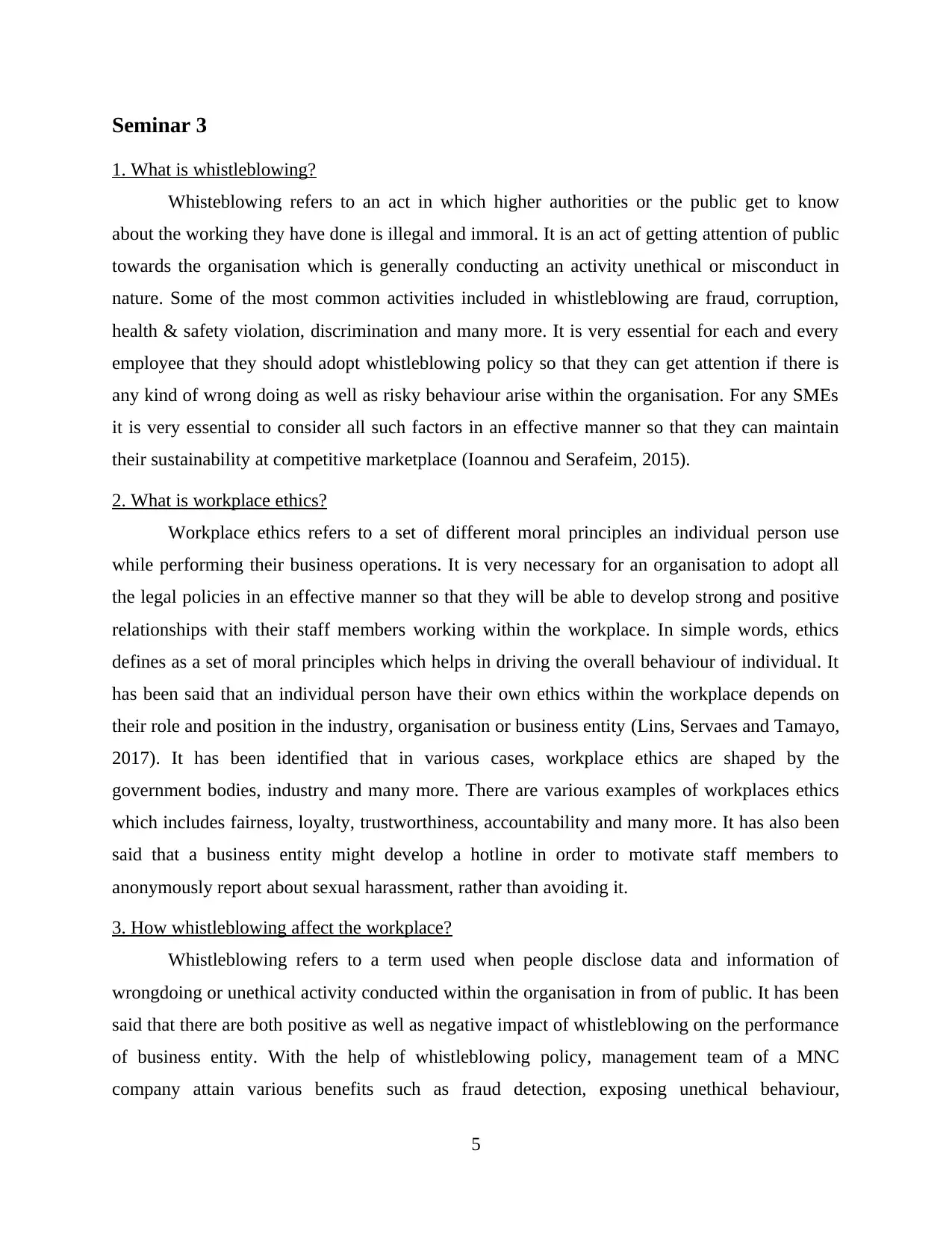
Seminar 3
1. What is whistleblowing?
Whisteblowing refers to an act in which higher authorities or the public get to know
about the working they have done is illegal and immoral. It is an act of getting attention of public
towards the organisation which is generally conducting an activity unethical or misconduct in
nature. Some of the most common activities included in whistleblowing are fraud, corruption,
health & safety violation, discrimination and many more. It is very essential for each and every
employee that they should adopt whistleblowing policy so that they can get attention if there is
any kind of wrong doing as well as risky behaviour arise within the organisation. For any SMEs
it is very essential to consider all such factors in an effective manner so that they can maintain
their sustainability at competitive marketplace (Ioannou and Serafeim, 2015).
2. What is workplace ethics?
Workplace ethics refers to a set of different moral principles an individual person use
while performing their business operations. It is very necessary for an organisation to adopt all
the legal policies in an effective manner so that they will be able to develop strong and positive
relationships with their staff members working within the workplace. In simple words, ethics
defines as a set of moral principles which helps in driving the overall behaviour of individual. It
has been said that an individual person have their own ethics within the workplace depends on
their role and position in the industry, organisation or business entity (Lins, Servaes and Tamayo,
2017). It has been identified that in various cases, workplace ethics are shaped by the
government bodies, industry and many more. There are various examples of workplaces ethics
which includes fairness, loyalty, trustworthiness, accountability and many more. It has also been
said that a business entity might develop a hotline in order to motivate staff members to
anonymously report about sexual harassment, rather than avoiding it.
3. How whistleblowing affect the workplace?
Whistleblowing refers to a term used when people disclose data and information of
wrongdoing or unethical activity conducted within the organisation in from of public. It has been
said that there are both positive as well as negative impact of whistleblowing on the performance
of business entity. With the help of whistleblowing policy, management team of a MNC
company attain various benefits such as fraud detection, exposing unethical behaviour,
5
1. What is whistleblowing?
Whisteblowing refers to an act in which higher authorities or the public get to know
about the working they have done is illegal and immoral. It is an act of getting attention of public
towards the organisation which is generally conducting an activity unethical or misconduct in
nature. Some of the most common activities included in whistleblowing are fraud, corruption,
health & safety violation, discrimination and many more. It is very essential for each and every
employee that they should adopt whistleblowing policy so that they can get attention if there is
any kind of wrong doing as well as risky behaviour arise within the organisation. For any SMEs
it is very essential to consider all such factors in an effective manner so that they can maintain
their sustainability at competitive marketplace (Ioannou and Serafeim, 2015).
2. What is workplace ethics?
Workplace ethics refers to a set of different moral principles an individual person use
while performing their business operations. It is very necessary for an organisation to adopt all
the legal policies in an effective manner so that they will be able to develop strong and positive
relationships with their staff members working within the workplace. In simple words, ethics
defines as a set of moral principles which helps in driving the overall behaviour of individual. It
has been said that an individual person have their own ethics within the workplace depends on
their role and position in the industry, organisation or business entity (Lins, Servaes and Tamayo,
2017). It has been identified that in various cases, workplace ethics are shaped by the
government bodies, industry and many more. There are various examples of workplaces ethics
which includes fairness, loyalty, trustworthiness, accountability and many more. It has also been
said that a business entity might develop a hotline in order to motivate staff members to
anonymously report about sexual harassment, rather than avoiding it.
3. How whistleblowing affect the workplace?
Whistleblowing refers to a term used when people disclose data and information of
wrongdoing or unethical activity conducted within the organisation in from of public. It has been
said that there are both positive as well as negative impact of whistleblowing on the performance
of business entity. With the help of whistleblowing policy, management team of a MNC
company attain various benefits such as fraud detection, exposing unethical behaviour,
5
Paraphrase This Document
Need a fresh take? Get an instant paraphrase of this document with our AI Paraphraser
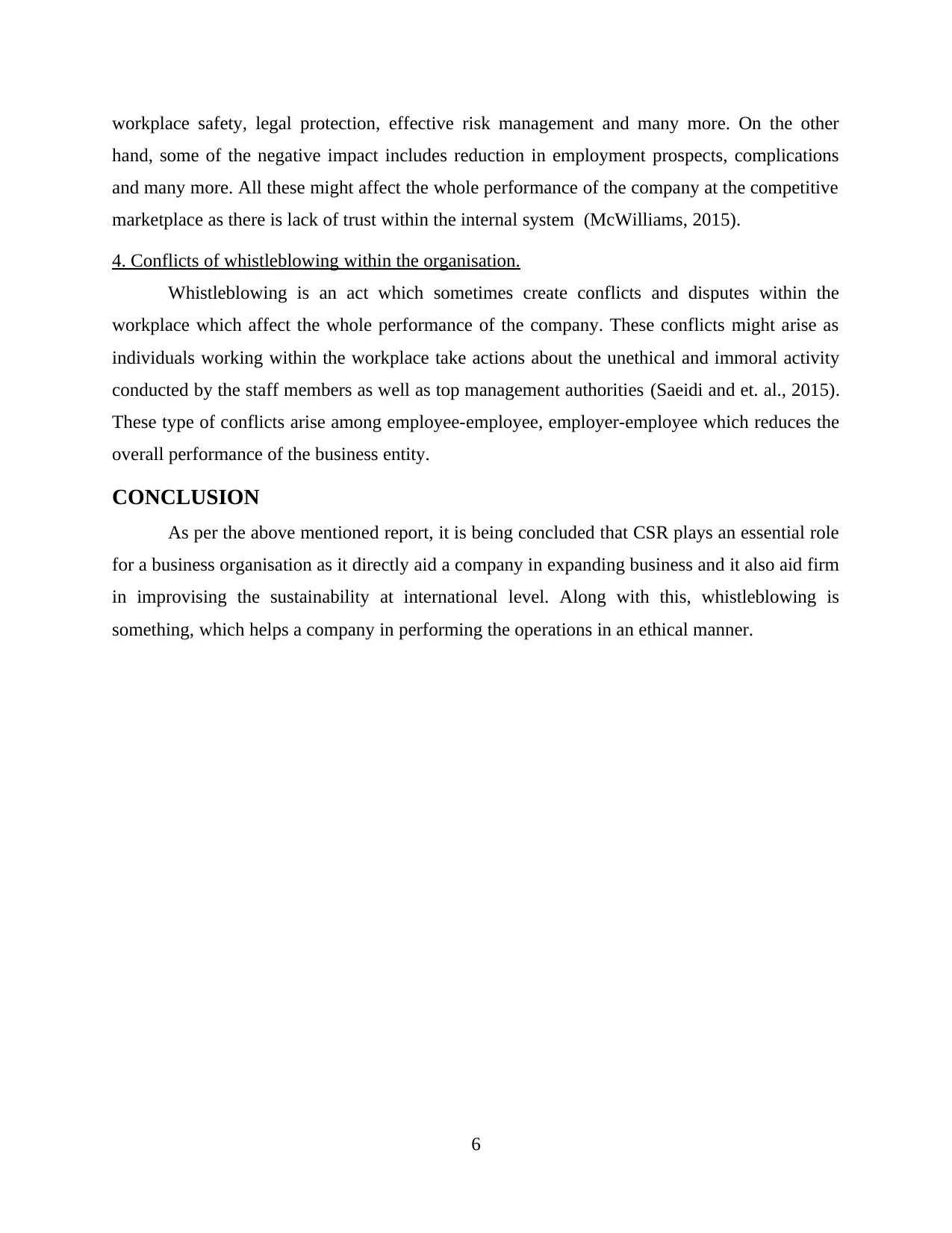
workplace safety, legal protection, effective risk management and many more. On the other
hand, some of the negative impact includes reduction in employment prospects, complications
and many more. All these might affect the whole performance of the company at the competitive
marketplace as there is lack of trust within the internal system (McWilliams, 2015).
4. Conflicts of whistleblowing within the organisation.
Whistleblowing is an act which sometimes create conflicts and disputes within the
workplace which affect the whole performance of the company. These conflicts might arise as
individuals working within the workplace take actions about the unethical and immoral activity
conducted by the staff members as well as top management authorities (Saeidi and et. al., 2015).
These type of conflicts arise among employee-employee, employer-employee which reduces the
overall performance of the business entity.
CONCLUSION
As per the above mentioned report, it is being concluded that CSR plays an essential role
for a business organisation as it directly aid a company in expanding business and it also aid firm
in improvising the sustainability at international level. Along with this, whistleblowing is
something, which helps a company in performing the operations in an ethical manner.
6
hand, some of the negative impact includes reduction in employment prospects, complications
and many more. All these might affect the whole performance of the company at the competitive
marketplace as there is lack of trust within the internal system (McWilliams, 2015).
4. Conflicts of whistleblowing within the organisation.
Whistleblowing is an act which sometimes create conflicts and disputes within the
workplace which affect the whole performance of the company. These conflicts might arise as
individuals working within the workplace take actions about the unethical and immoral activity
conducted by the staff members as well as top management authorities (Saeidi and et. al., 2015).
These type of conflicts arise among employee-employee, employer-employee which reduces the
overall performance of the business entity.
CONCLUSION
As per the above mentioned report, it is being concluded that CSR plays an essential role
for a business organisation as it directly aid a company in expanding business and it also aid firm
in improvising the sustainability at international level. Along with this, whistleblowing is
something, which helps a company in performing the operations in an ethical manner.
6
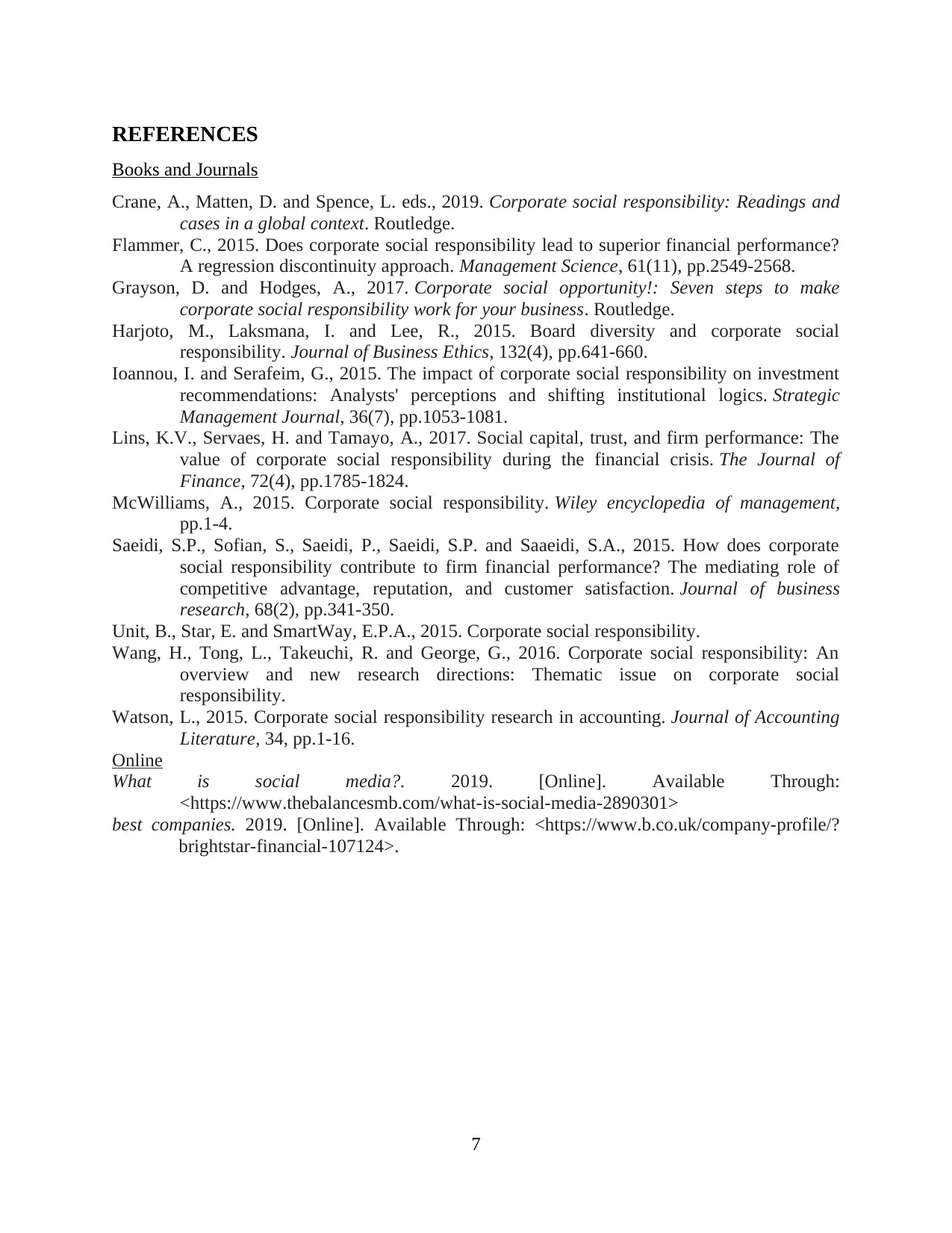
REFERENCES
Books and Journals
Crane, A., Matten, D. and Spence, L. eds., 2019. Corporate social responsibility: Readings and
cases in a global context. Routledge.
Flammer, C., 2015. Does corporate social responsibility lead to superior financial performance?
A regression discontinuity approach. Management Science, 61(11), pp.2549-2568.
Grayson, D. and Hodges, A., 2017. Corporate social opportunity!: Seven steps to make
corporate social responsibility work for your business. Routledge.
Harjoto, M., Laksmana, I. and Lee, R., 2015. Board diversity and corporate social
responsibility. Journal of Business Ethics, 132(4), pp.641-660.
Ioannou, I. and Serafeim, G., 2015. The impact of corporate social responsibility on investment
recommendations: Analysts' perceptions and shifting institutional logics. Strategic
Management Journal, 36(7), pp.1053-1081.
Lins, K.V., Servaes, H. and Tamayo, A., 2017. Social capital, trust, and firm performance: The
value of corporate social responsibility during the financial crisis. The Journal of
Finance, 72(4), pp.1785-1824.
McWilliams, A., 2015. Corporate social responsibility. Wiley encyclopedia of management,
pp.1-4.
Saeidi, S.P., Sofian, S., Saeidi, P., Saeidi, S.P. and Saaeidi, S.A., 2015. How does corporate
social responsibility contribute to firm financial performance? The mediating role of
competitive advantage, reputation, and customer satisfaction. Journal of business
research, 68(2), pp.341-350.
Unit, B., Star, E. and SmartWay, E.P.A., 2015. Corporate social responsibility.
Wang, H., Tong, L., Takeuchi, R. and George, G., 2016. Corporate social responsibility: An
overview and new research directions: Thematic issue on corporate social
responsibility.
Watson, L., 2015. Corporate social responsibility research in accounting. Journal of Accounting
Literature, 34, pp.1-16.
Online
What is social media?. 2019. [Online]. Available Through:
<https://www.thebalancesmb.com/what-is-social-media-2890301>
best companies. 2019. [Online]. Available Through: <https://www.b.co.uk/company-profile/?
brightstar-financial-107124>.
7
Books and Journals
Crane, A., Matten, D. and Spence, L. eds., 2019. Corporate social responsibility: Readings and
cases in a global context. Routledge.
Flammer, C., 2015. Does corporate social responsibility lead to superior financial performance?
A regression discontinuity approach. Management Science, 61(11), pp.2549-2568.
Grayson, D. and Hodges, A., 2017. Corporate social opportunity!: Seven steps to make
corporate social responsibility work for your business. Routledge.
Harjoto, M., Laksmana, I. and Lee, R., 2015. Board diversity and corporate social
responsibility. Journal of Business Ethics, 132(4), pp.641-660.
Ioannou, I. and Serafeim, G., 2015. The impact of corporate social responsibility on investment
recommendations: Analysts' perceptions and shifting institutional logics. Strategic
Management Journal, 36(7), pp.1053-1081.
Lins, K.V., Servaes, H. and Tamayo, A., 2017. Social capital, trust, and firm performance: The
value of corporate social responsibility during the financial crisis. The Journal of
Finance, 72(4), pp.1785-1824.
McWilliams, A., 2015. Corporate social responsibility. Wiley encyclopedia of management,
pp.1-4.
Saeidi, S.P., Sofian, S., Saeidi, P., Saeidi, S.P. and Saaeidi, S.A., 2015. How does corporate
social responsibility contribute to firm financial performance? The mediating role of
competitive advantage, reputation, and customer satisfaction. Journal of business
research, 68(2), pp.341-350.
Unit, B., Star, E. and SmartWay, E.P.A., 2015. Corporate social responsibility.
Wang, H., Tong, L., Takeuchi, R. and George, G., 2016. Corporate social responsibility: An
overview and new research directions: Thematic issue on corporate social
responsibility.
Watson, L., 2015. Corporate social responsibility research in accounting. Journal of Accounting
Literature, 34, pp.1-16.
Online
What is social media?. 2019. [Online]. Available Through:
<https://www.thebalancesmb.com/what-is-social-media-2890301>
best companies. 2019. [Online]. Available Through: <https://www.b.co.uk/company-profile/?
brightstar-financial-107124>.
7
1 out of 9
Related Documents
Your All-in-One AI-Powered Toolkit for Academic Success.
+13062052269
info@desklib.com
Available 24*7 on WhatsApp / Email
![[object Object]](/_next/static/media/star-bottom.7253800d.svg)
Unlock your academic potential
© 2024 | Zucol Services PVT LTD | All rights reserved.





